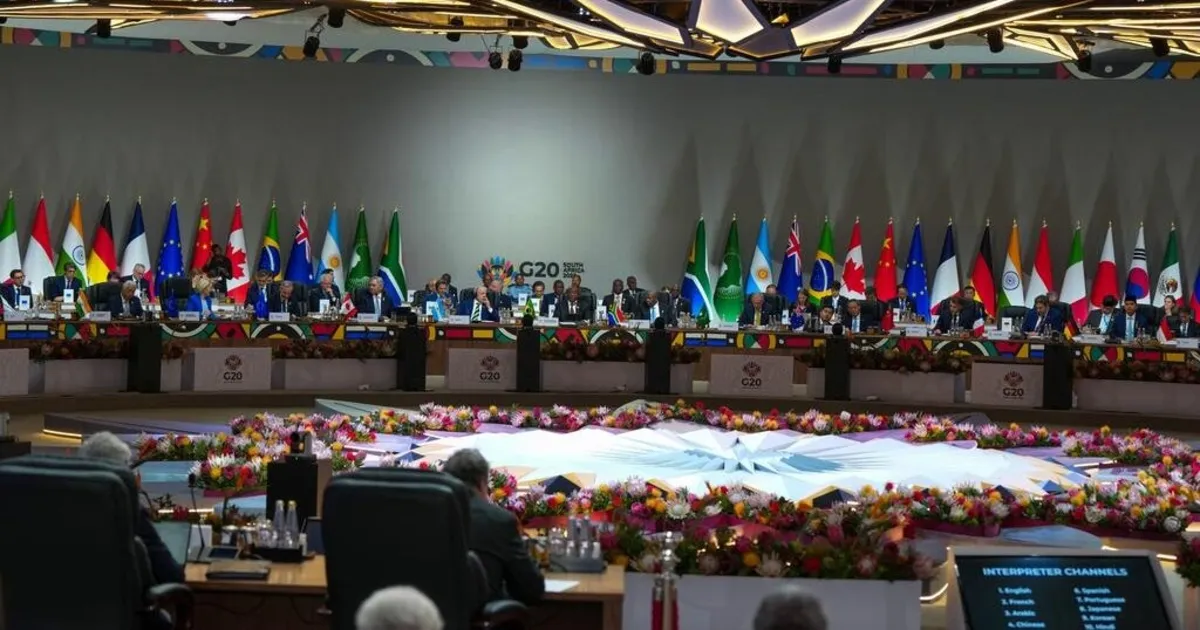
World leaders from the Group of 20 (G20), which includes both rich and developing economies, made a significant move by adopting a leaders' declaration at the commencement of their summit in South Africa on Saturday. This decision marked a departure from the typical tradition of issuing declarations at the conclusion of such summits. The meeting took place in Johannesburg, and despite the absence of the United States—boycotting the event amid a diplomatic rift with the host country—the declaration was adopted unanimously by the other participating nations.
Vincent Magwenya, spokesperson for South African President Cyril Ramaphosa, confirmed that the declaration was embraced by all present leaders, highlighting its importance for the first G20 summit hosted on African soil. While specific details of the declaration were not disclosed, South Africa positioned it as a pivotal victory aimed at prioritizing issues that significantly impact poorer nations, particularly in terms of climate change and inequality.
The backdrop of the summit was notably influenced by the U.S. boycott, instigated by President Trump due to allegations that South Africa is implementing racist policies against its white minority. Despite pressure from the U.S. to refrain from adopting a leaders' declaration without American representation, South African officials proceeded with the unanimous vote, showcasing their commitment to the agenda.
The agenda set forth by South Africa as the rotating G20 presidency aims to tackle several pressing issues, including the recovery of poor countries from climate-related disasters, alleviating foreign debt burdens, and promoting a transition to green energy. The emphasis on these topics comes amid a growing concern over global inequality, which has been exacerbated by the ongoing effects of climate change.
United Nations Secretary-General António Guterres acknowledged the importance of the summit, expressing hope that the G20 could effectively prioritize the needs of developing nations and implement meaningful reforms. He commended South Africa for bringing these critical issues to the forefront of the discussions.
The absence of the world’s largest economy, due to Trump's boycott, cast a shadow over the summit. French President Emmanuel Macron expressed regret over the U.S. withdrawal but emphasized the necessity for remaining members to engage collaboratively in addressing global challenges.
The G20, composed of 19 nations along with the European Union and the African Union, was established in 1999 to foster dialogue between developed and developing countries in response to global financial crises. Collectively, G20 members account for approximately 85% of the global economy and over half of the world's population. However, achieving consensus among members with varying interests, such as the U.S., Russia, China, and India, has proven challenging.
Traditionally, G20 summits conclude with a leaders' declaration summarizing agreements reached. South Africa faced pressure from the U.S. to dilute the final document to a unilateral statement, which President Ramaphosa firmly rejected, asserting, "we will not be bullied." As the summit nears its conclusion, the future direction of the G20 could shift dramatically, especially with the U.S. set to assume the rotating presidency from South Africa.
In a display of diplomatic tension, the only representative from the U.S. expected to attend the summit will be a junior official from the American Embassy in South Africa. South African officials conveyed their displeasure at this arrangement, emphasizing that President Ramaphosa would not be handing over the presidency to a junior diplomat, highlighting the complexities of international relations at this pivotal summit.